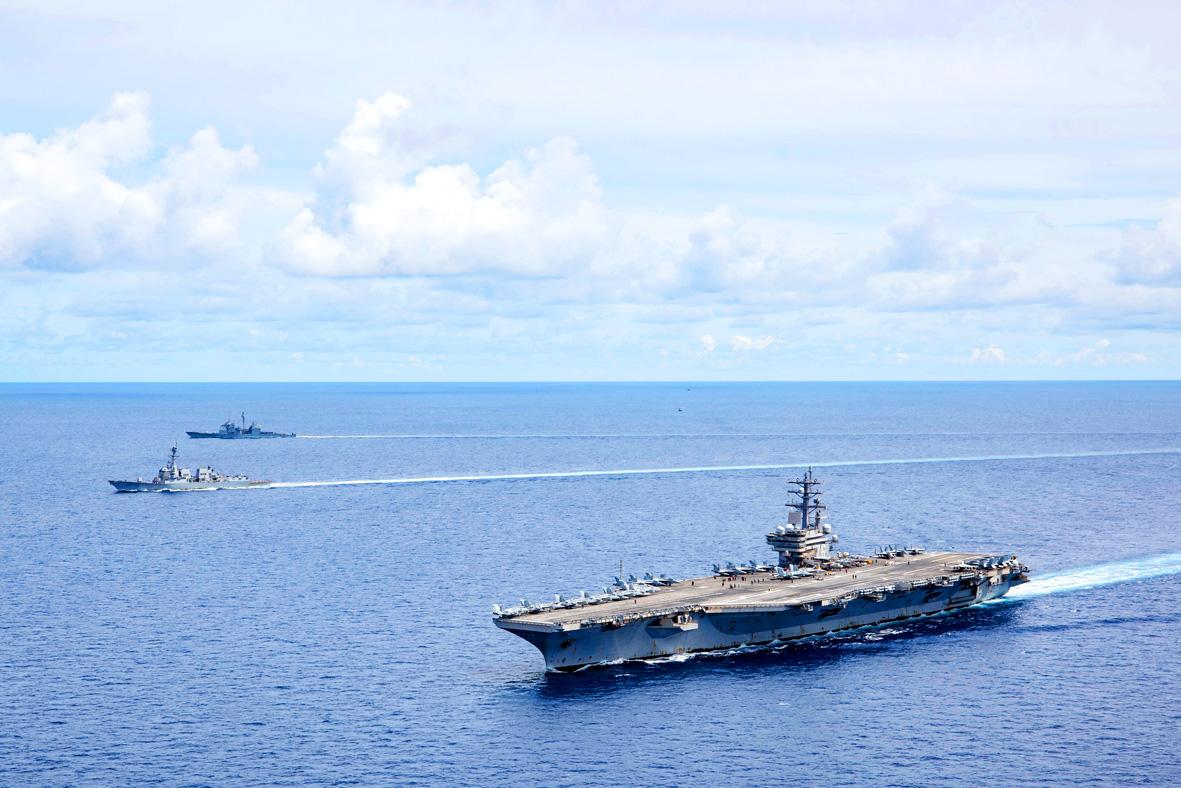The USS Mustin, an Arleigh Burke-class guided-missile destroyer, sailed through the Taiwan Strait yesterday, the 12th time this year that a US warship transited the waterway.
The US 7th Fleet said in a statement that the Mustin conducted a routine transit in accordance with international law.
“The ship’s transit through the Taiwan Strait demonstrates the US commitment to a free and open Indo-Pacific. The United States military will continue to fly, sail and operate anywhere international law allows,” the statement read.

Photo: EPA/EFE
The Ministry of National Defense said that the US vessel entered the Strait from the north and headed south.
Taiwan University associate professor of political science Chen Shih-min (陳世民) said that the US Navy is conducting warship transits through the Strait to support freedom of navigation in waters near Taiwan and its national security.
The transits show that the US would not tolerate China’s behavior of circling Taiwan’s territorial waters and airspace with warships and military aircraft, or its attempt to transform the Strait into Chinese territory, he said.
US warships sailed through the Strait nine times last year.
Institute for National Defense and Security Research assistant research fellow Jeremy Hung (洪子傑) said that the higher number of US transits this year reflects the US-China competition for influence in the region.
“In addition to warships, US military aircraft have also carried out more fly-bys in the airspace [around Taiwan] with their IFF [identification friend or foe] systems turned on, a move that is calculated to telegraph their presence to other countries and send a political message,” he said.
The previous time a US warship navigated the Strait was on Nov. 21.
The US 7th Fleet in a Facebook post the same day identified the ship as the Arleigh Burke-class guided-missile destroyer USS Barry.
“The ship’s transit through the Taiwan Strait demonstrates the US commitment to a free and open Indo-Pacific. The US Navy will continue to fly, sail and operate anywhere international law allows,” the post said.
“The United States and Taiwan are strong partners in defending freedom, advancing economic ties, and promoting our shared democratic values. The American Institute in Taiwan Economic Prosperity Partnership Dialogue strengthens our economic relationship even further,” US Secretary of State Mike Pompeo wrote on Twitter the same day.

PREPAREDNESS: Given the difficulty of importing ammunition during wartime, the Ministry of National Defense said it would prioritize ‘coproduction’ partnerships A newly formed unit of the Marine Corps tasked with land-based security operations has recently replaced its aging, domestically produced rifles with more advanced, US-made M4A1 rifles, a source said yesterday. The unnamed source familiar with the matter said the First Security Battalion of the Marine Corps’ Air Defense and Base Guard Group has replaced its older T65K2 rifles, which have been in service since the late 1980s, with the newly received M4A1s. The source did not say exactly when the upgrade took place or how many M4A1s were issued to the battalion. The confirmation came after Chinese-language media reported

The Taiwanese passport ranked 33rd in a global listing of passports by convenience this month, rising three places from last month’s ranking, but matching its position in January last year. The Henley Passport Index, an international ranking of passports by the number of designations its holder can travel to without a visa, showed that the Taiwan passport enables holders to travel to 139 countries and territories without a visa. Singapore’s passport was ranked the most powerful with visa-free access to 192 destinations out of 227, according to the index published on Tuesday by UK-based migration investment consultancy firm Henley and Partners. Japan’s and

A Ministry of Foreign Affairs official yesterday said that a delegation that visited China for an APEC meeting did not receive any kind of treatment that downgraded Taiwan’s sovereignty. Department of International Organizations Director-General Jonathan Sun (孫儉元) said that he and a group of ministry officials visited Shenzhen, China, to attend the APEC Informal Senior Officials’ Meeting last month. The trip went “smoothly and safely” for all Taiwanese delegates, as the Chinese side arranged the trip in accordance with long-standing practices, Sun said at the ministry’s weekly briefing. The Taiwanese group did not encounter any political suppression, he said. Sun made the remarks when

BROAD AGREEMENT: The two are nearing a trade deal to reduce Taiwan’s tariff to 15% and a commitment for TSMC to build five more fabs, a ‘New York Times’ report said Taiwan and the US have reached a broad consensus on a trade deal, the Executive Yuan’s Office of Trade Negotiations said yesterday, after a report said that Washington is set to reduce Taiwan’s tariff rate to 15 percent. The New York Times on Monday reported that the two nations are nearing a trade deal to reduce Taiwan’s tariff rate to 15 percent and commit Taiwan Semiconductor Manufacturing Co (TSMC, 台積電) to building at least five more facilities in the US. “The agreement, which has been under negotiation for months, is being legally scrubbed and could be announced this month,” the paper said,